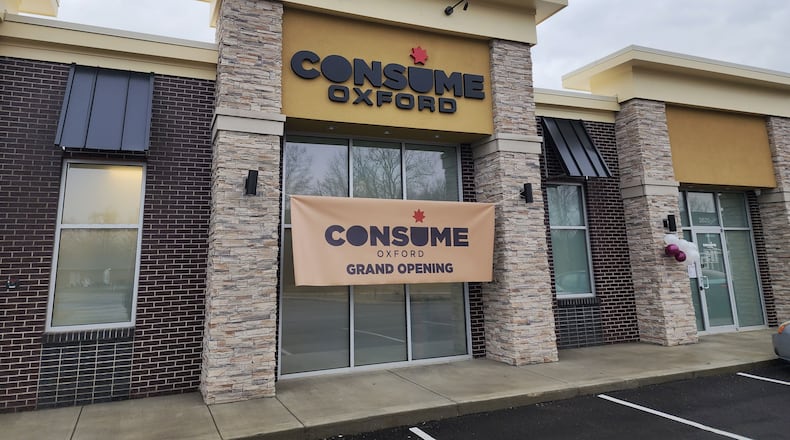The 70-year-old Oxford resident started smoking marijuana when she went to college more than 50 years ago. However, in the last four years Gormly has switched to medical cannabis to help with pain and sleep.
“What I’ve experienced here in the general population there’s a lot of misconception about using medical marijuana,” Gormly said. “I have had to be dependent on the senior center to get me to different places, ... and a couple women that didn’t know anything about the senior center, they didn’t want to take me to a dispensary because they thought that meant I was addicted.”
Gormly says she goes to Pure Iconic, but it “looks like a prison” and all the merchandise is essentially hidden, unlike dispensaries in Cincinnati where she says everything is in glass cabinets and out in the open.
Later this year, Pure Iconic and Oxford’s second medical marijuana dispensary, Consume Oxford, could start selling recreational cannabis. Ohio voters passed a ballot measure last November to legalize recreational marijuana, and the state is in the process of implementing the measure this year.
Medicinal to recreational
So far this year, Ohio’s Division of Cannabis Control (DCC) has given provisional licenses to 110 dispensaries in Ohio, including the two in Oxford. Neither Pure Iconic nor Consume Oxford can actually start selling recreational products until they receive certificates of operation from the DCC.
On June 7, 2024, the DCC within the Ohio Department of Commerce started to identify qualified applicants for dual-use provisional licenses.
A provisional license doesn’t permit selling non-medical cannabis. Instead, it’s issued as a placeholder while the licensee works to meet the necessary requirements to obtain a certificate of operation, said Jamie Crawford, public information officer in the Ohio Department of Commerce, in an email to the Oxford Free Press.
Once requirements are met, DCC can distribute certificates on or before Sept. 7, 2024 based on the order in which completed applications were received.
Consume first opened its doors in February 2023, while Pure Iconic opened four months later in July. Gormly says even though the Oxford dispensaries are different from what she’s used to, she’s excited for them to be recreational. Since moving to Oxford in September of 2023, she said she’s struggled to access recreational marijuana.
Neither dispensary provided comments to the Free Press as of July 17.
Ohio’s Medical Marijuana Control Program allows people to use oils, lotions, plant material, edibles and patches, but no smoking.
“I use a vape pen,” Gormly said, “which is supposedly not really good for people, but I’m 70. I figure, you know, if it knocks me off sooner, it doesn’t matter.”
In order to have access to medical marijuana, a patient is required to visit a physician at least once per year to determine if they have a condition qualifying them to be a medical marijuana patient, according to the Medical Marijuana Control Program.
The patient must then ensure all registration information is correct in order to receive their registry card.
Only patients with an active registry card, an active recommendation and their government-issued ID can purchase medical marijuana, according to the Medical Marijuana Control Program.
In 2019, medical marijuana could cost more than $500 per ounce, according to the Ohio Marijuana Card. In 2022, the costs were almost cut in half and are expected to continue decreasing as support rises.
However, on the federal level cannabis remains illegal, making it unlikely to be covered by insurance.
The federal government classifies cannabis, along with heroin and cocaine, as a Schedule I drug with a high potential for abuse and little to no medical benefit, according to the Marijuana Policy Project. However, the U.S. Department of Justice formally proposed reclassifying cannabis as a Schedule III drug in late May and is accepting comments on the proposal until July 22.
In 2017, Oxford City Council adopted a resolution authorizing the city manager or his designee to provide local zoning information and facilitate potential applications for cultivators, processors, testing labs and or dispensaries of medical marijuana, City Manager Doug Elliott said. He added that Oxford has only received applications for dispensaries.
“We expect that the recreational marijuana facilities, you know, will follow the letter of the law,” Elliott said. “[And] I think it’s the same with any, be it alcohol or marijuana, that one should consume it responsibly.”
As of July 12, 2024, DCC has received 244 applications to convert active medical marijuana licenses to dual-use cannabis licenses, Crawford wrote. The DCC has notified 201 facilities that they qualify for a provisional license, including 118 dispensaries.
So far, there have been no certificates of operation issued to dispensaries to begin selling non-medical cannabis, Crawford wrote.
Out of the 110 dispensaries with provisional licenses in Ohio, Butler County has five and Oxford has two, according to the DCC’s Ohio cannabis dispensary map.
As of July 17, the state has not identified a specific day for sales to begin. Instead, it will be up to individual businesses once they receive certificates of operation.
This article originally published in the Oxford Free Press, a content partner of the Journal-News. Read it online at oxfreepress.com.
About the Author
